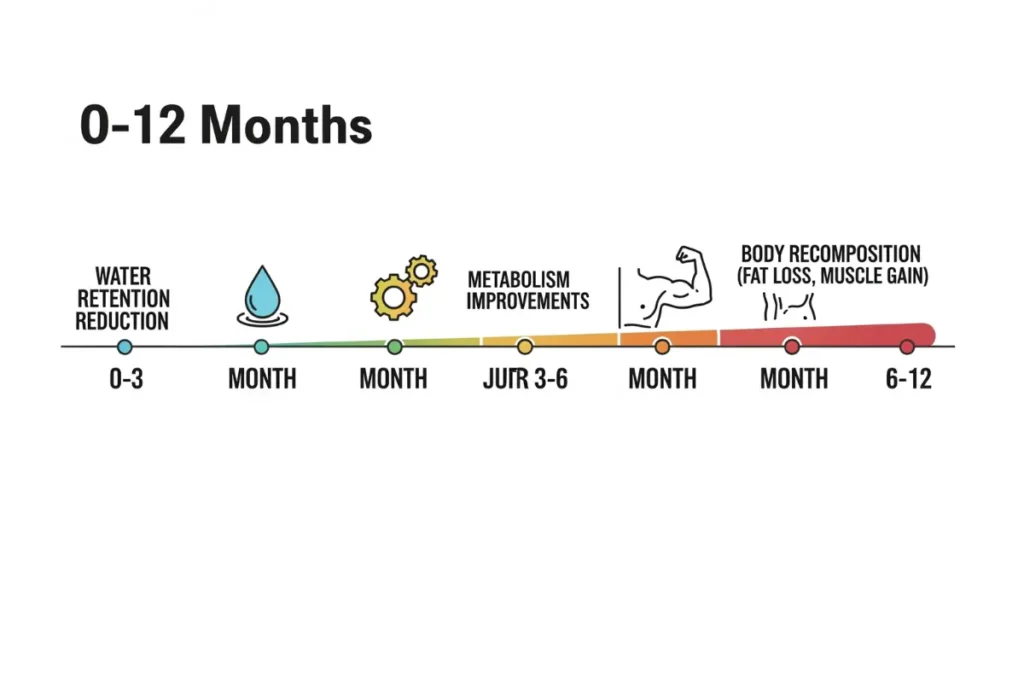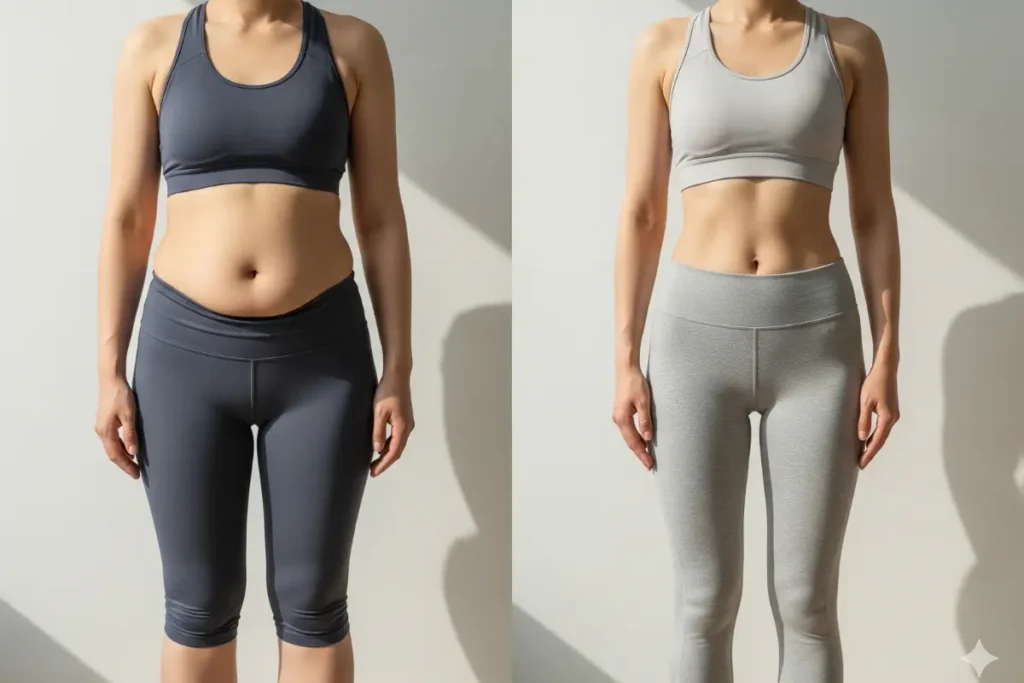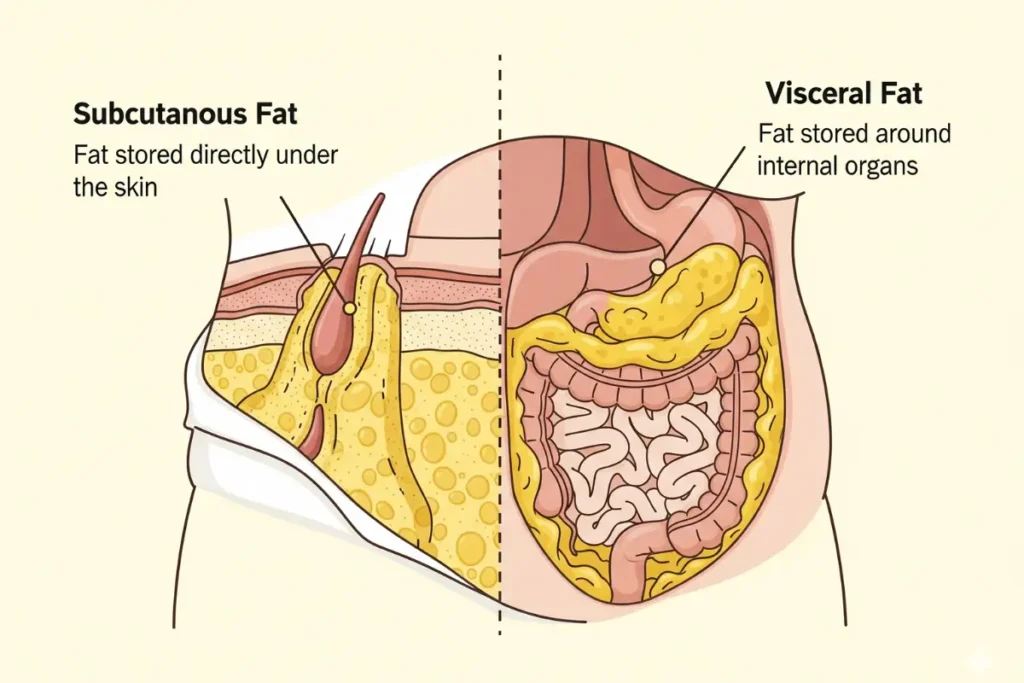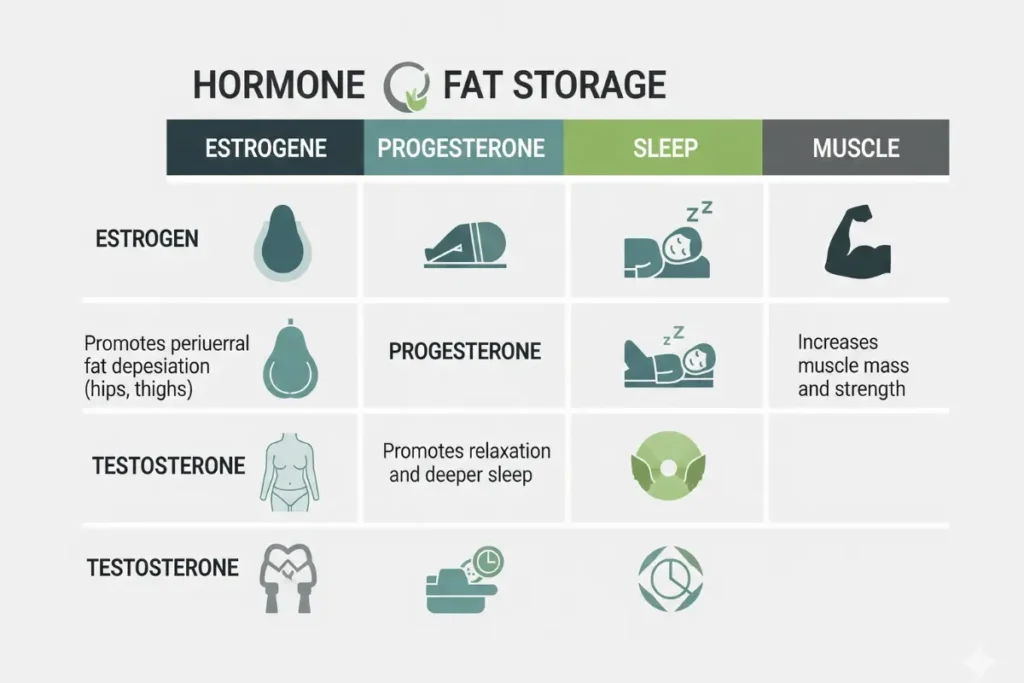
How long does it take to lose weight on HRT? It’s one of the most common questions people ask when starting hormone replacement therapy. The honest answer is that HRT itself is not a weight-loss treatment. Its main purpose is to relieve symptoms of menopause or low hormones, such as hot flashes, poor sleep, and mood swings.
That said, by restoring hormone balance, HRT may make it easier to maintain your weight or see modest improvements in body composition. For instance, estrogen can support insulin sensitivity and help protect muscle, which both influence how the body stores and burns fat.
Still, results vary widely. Some people experience early bloating or water retention that looks like weight gain, while others notice more energy or better sleep first—factors that indirectly make weight management easier.
This guide will explain what you can realistically expect, why weight sometimes goes up before it goes down, and how to support healthy weight management while on HRT.
What Exactly Is Hormone Replacement Therapy (HRT)?
Hormone replacement therapy is a medical treatment designed to replace or balance hormones that naturally decline with age, menopause, or certain health conditions. The most common use is in women going through menopause, when estrogen and progesterone levels drop, but men can also use HRT to replace testosterone.
Think of hormones as your body’s “messengers.” They tell cells what to do—when to store fat, when to burn energy, how to regulate mood, and even how well you sleep. When those signals are out of balance, the body can respond with:
- Slower metabolism (you burn fewer calories at rest).
- Shifts in fat storage (more belly fat, less in hips or thighs).
- Changes in appetite (increased cravings or emotional eating).
- Reduced muscle mass (harder to burn fat, easier to gain weight).
HRT steps in to help restore some of those signals.
Example:
Imagine your body as a thermostat. Before menopause, estrogen keeps the “temperature” stable, regulating fat storage and metabolism. During menopause, estrogen drops, and the thermostat swings wildly—leading to belly fat, hot flashes, and mood shifts. HRT acts like resetting the thermostat so the body can return to a more balanced state.
Common Types of HRT
- Estrogen therapy: Helps reduce belly fat and hot flashes, but may need to be combined with progesterone for safety.
- Progesterone therapy: Balances estrogen, reduces uterine cancer risk, but can sometimes increase appetite or bloating.
- Testosterone (less common in women, more in men): Helps preserve muscle mass, boosts metabolism, and supports energy.
- Delivery methods: Pills, patches, gels, creams, or injections. Each one can affect the body slightly differently.
What is the Realistic Timeline for Weight Change on HRT?

Hormones don’t flip a switch overnight. Instead, they set off a series of adjustments in metabolism, fat distribution, and water balance. That’s why one person might notice changes in a few weeks, while another may not see any difference for several months.
Here’s what the general timeline tends to look like:
| Time on HRT | What Typically Happens | Weight-Related Notes |
|---|---|---|
| 0–3 months | Hormone levels start to stabilize; some water retention, mood changes, and appetite shifts are common. | Many people notice bloating or even a few extra pounds. This is usually temporary water weight, not fat gain. |
| 3–6 months | Body begins adjusting to new baseline; energy and sleep often improve; metabolism may respond more steadily. | Some people begin losing weight if paired with diet/exercise changes. Others may stay the same as hormones continue balancing. |
| 6–12 months | Hormonal effects on muscle mass, fat distribution, and appetite regulation become clearer. | This is when weight loss (or body recomposition) is most noticeable, especially with lifestyle support. |
| 12+ months | Long-term benefits: improved bone health, fat distribution more stable, better energy for exercise. | Sustainable weight loss becomes more achievable if combined with consistent habits. |
How long after starting HRT did people lose weight?
In clinical studies, most participants didn’t report significant weight changes before the 3–6 month mark. For some, the first sign isn’t even a lower number on the scale—it’s looser clothing or feeling stronger in workouts.
Tip: If you don’t notice weight changes right away, don’t assume HRT isn’t working. Early improvements in sleep, mood, or energy often show up first and lay the groundwork for later weight shifts.
Does weight gain from HRT go away?
Yes, in many cases. The “weight gain” reported in the first 1–3 months is often water retention or temporary bloating, not fat. As hormone levels balance, this usually improves. If weight gain continues past six months, it’s worth discussing with your doctor, since dosage, type of HRT, or lifestyle factors may be playing a role.
How long does HRT take to change body shape and metabolism?
Visible changes in fat distribution (like less weight sticking to the belly, or better muscle retention) usually take 6–12 months. Metabolic benefits, such as improved insulin sensitivity or energy use, often track along the same timeline.
This is why patience matters—HRT sets the stage, but sustainable results build gradually.
Why You Might Gain Weight on HRT First (And How to Manage It)
For many people, the first few months on HRT bring an unwanted surprise: the number on the scale goes up instead of down. This can feel discouraging, but in most cases, it’s not true fat gain—it’s your body adjusting to new hormone signals.

Think of it like adjusting the water pressure in your shower. At first, the pipes rattle and the flow is uneven, but after a while, everything evens out. Your body does something similar when hormones are reintroduced or balanced—it takes time to settle.
Why am I putting on weight so fast on HRT?
The most common reasons include:
- Water retention – Estrogen can make the body hold onto more fluid, especially in the first 1–3 months.
- Appetite changes – Some women notice stronger cravings when progesterone is reintroduced.
- Metabolism lag – Hormonal balance doesn’t fix metabolism instantly; it can take months before energy burn improves.
- Lifestyle overlap – Stress, poor sleep, or lack of activity during menopause often continue even after starting HRT.
Example:
Anna, 52, gained four pounds in her first six weeks on HRT. She felt puffy and bloated, but noticed her hot flashes were easing. By month four, most of that extra weight disappeared as her body adjusted.
Is it harder to lose weight while on HRT?
Not necessarily—but it can feel that way in the beginning. Remember, HRT is balancing hormones, not directly burning fat. If weight gain happens early on, it’s usually temporary. In fact, research shows that estrogen therapy can help reduce belly fat over time by improving insulin sensitivity and preventing muscle loss.HRT won’t magically make pounds melt away, but it can make it easier to respond to healthy eating and exercise once your body adjusts.
How to Tell if Weight Gain is Hormonal or Lifestyle-Driven
Here’s a simple way to check:
- Hormonal:
- Sudden weight gain in the first 1–3 months
- Mostly bloating or swelling (rings feel tighter, belly feels “puffy”)
- Evens out after dosage stabilises
- Lifestyle-driven:
- Gradual weight gain over several months
- Linked to higher calorie intake, low activity, or poor sleep
- Doesn’t resolve without habit changes
Quick self-check:
If your weight jumped up quickly but your eating and exercise stayed the same, hormones are the likely cause. If the scale has been creeping up for months while lifestyle hasn’t changed, it’s worth looking at daily habits alongside HRT.
How to Manage Early Weight Gain on HRT
- Stay patient – Water weight usually resolves within 3–6 months.
- Track habits – Use a journal or app to track food, sleep, and activity. This helps separate hormonal effects from lifestyle ones.
- Prioritise protein – Helps reduce cravings and preserve muscle (which supports metabolism).
- Move daily – Even light walks counteract fluid retention.
Talk to your doctor – If weight continues climbing past six months, dosage or type of HRT may need adjusting.
Can HRT Help Reduce Belly Fat?
One of the biggest frustrations around midlife weight gain is the stomach area. Even women who were always slim in their 30s often say, “Why is all my weight going straight to my belly now?”

This isn’t your imagination; it’s a common effect of changing hormone levels. And it’s exactly where HRT can make a difference.
Why is my stomach so big on HRT?
Here’s the tricky part: belly changes can happen before HRT and sometimes after starting it, too.
- Before HRT: Falling estrogen shifts fat storage from hips and thighs to the waistline. This is why many women develop more of an “apple” shape during menopause.
- On HRT: Early side effects like water retention or bloating can temporarily make the stomach look bigger, even if actual fat hasn’t increased.
Example:
Maria, 49, noticed her jeans felt tighter just three months into menopause. After starting HRT, she felt even more bloated in the first six weeks—but by month five, the bloating eased, and her waistline stopped expanding.
Can you flatten a menopause belly?
Yes, but HRT alone isn’t a magic eraser. What it can do is restore some of the hormone signals that protect against belly fat, especially when combined with smart habits.
- Estrogen improves insulin sensitivity, meaning your body handles carbs better.
- Progesterone helps with sleep, which reduces cortisol-driven belly fat.
- Testosterone supports muscle mass, making it easier to burn fat.
Think of HRT as resetting the playing field. It doesn’t win the game for you, but it makes the rules fairer, so diet, exercise, and lifestyle efforts pay off.
Which hormone reduces belly fat?
- Estrogen is the main player. Studies show it helps reduce visceral fat (the “dangerous” fat around organs) and shifts storage away from the belly.
- Testosterone supports lean muscle, which burns more calories even at rest.
Progesterone doesn’t directly reduce fat but helps indirectly through better sleep and less fluid retention.
Everyday Analogy:
Think of belly fat as clutter in a house. Estrogen is like having a good organiser who prevents mess from piling up. Testosterone is like having a strong friend to help move heavy boxes out. Progesterone doesn’t clean the house directly, but it makes sure you get enough rest so you have the energy to do it yourself.
Mini Case Study
A 2022 clinical review found that postmenopausal women on estrogen therapy gained less belly fat over 12 months compared to women not on HRT. Many didn’t lose all the fat they’d gained, but they slowed or stopped further belly expansion—and saw better results when they paired HRT with resistance training and a higher-protein diet.
The Role of Different Hormones in Weight Management

Hormones don’t just influence hot flashes or mood swings—they also shape where your body stores fat, how hungry you feel, and how much energy you burn. Understanding the “big three” hormones in HRT—estrogen, progesterone, and testosterone—helps explain why weight can shift during midlife and how therapy may help.
Estrogen – The Fat Distribution Manager
Estrogen acts like a traffic controller for fat storage. Before menopause, it directs fat mostly to the hips and thighs. When estrogen drops, the “traffic” changes, and fat is rerouted to the belly.
- Low estrogen = more belly fat, less muscle protection.
- Balanced estrogen = better insulin sensitivity (your body handles sugar more efficiently).
Example:
Think of estrogen as the GPS in your car. When it’s working, fat is stored in a predictable, healthier pattern. Without it, the GPS “loses signal,” and belly fat becomes the default destination.
H3: Progesterone – The Balancer (with Side Effects)
Progesterone’s role is more indirect, but still important.
- It helps counterbalance estrogen, keeping uterine health safe.
- It can reduce anxiety and improve sleep, which lowers cortisol (a stress hormone that promotes belly fat).
- But it can also trigger water retention and food cravings in some women, especially early on.
Everyday Analogy:
Progesterone is like a supportive roommate—helpful in keeping things calm, but sometimes leaves dirty dishes in the sink (bloating and cravings).
H3: Testosterone – The Muscle Preserver
Though women have much lower testosterone than men, it’s still vital for metabolism.
- Supports muscle mass (muscle burns calories even at rest).
- Boosts energy and exercise recovery, making it easier to stay active.
- Helps prevent fat from concentrating in the belly.
Example:
Testosterone works like the engine in a car. Even if it’s small, it keeps everything running. Without it, the “vehicle” (your metabolism) slows down.
| Hormone | Main Role in Weight | When Low | When Balanced (via HRT) |
|---|---|---|---|
| Estrogen | Regulates fat storage & insulin use | More belly fat, reduced muscle protection | Less belly fat, better metabolism |
| Progesterone | Calms mood, supports sleep | Anxiety, poor sleep → higher cortisol | Better sleep, reduced stress-related fat |
| Testosterone | Preserves muscle, boosts energy | Muscle loss, slower metabolism | More lean mass, easier fat loss |
Each hormone plays a different role, but they work best together. Estrogen helps manage where fat goes, progesterone helps keep stress fat in check, and testosterone makes sure your body has the muscle power to burn calories.
Best HRT & Lifestyle Strategies for Losing Weight

HRT can reset some of the hormonal signals that influence weight, but it isn’t a magic pill. The best results come when therapy is paired with smart habits. Think of HRT as the foundation of a house—it stabilises the structure, but you still need the right furniture and design (diet, exercise, sleep) to make it livable.
Which HRT Options Support Weight Loss Best?
Not all HRT works the same way. Your doctor chooses the type based on your health needs, but here’s what research shows about weight effects:
- Estrogen-only therapy (for women who’ve had a hysterectomy) often helps slow belly fat gain.
- Combined estrogen + progesterone balances safety but may cause bloating at first.
- Transdermal patches or gels sometimes cause less bloating than pills because they bypass the liver.
- Low-dose testosterone (in select cases) may help preserve lean muscle, though it’s not commonly prescribed for women unless levels are very low.
Note: The “best” type isn’t universal—it depends on your symptoms, age, and health history. That’s why a healthcare professional should always guide HRT.
What Diet Works Best While on HRT?
Since HRT helps stabilise hormones, the right diet can take advantage of that balance:
- Prioritise protein (25–30 g per meal): supports muscle and keeps you full.
- Choose high-fiber carbs like whole grains, beans, and vegetables to steady blood sugar.
- Healthy fats (avocados, olive oil, nuts) support hormone health.
- Limit added sugar & alcohol—they worsen belly fat storage and disrupt sleep.
Example:
A simple day of eating might look like:
- Breakfast: Greek yogurt with berries and chia seeds
- Lunch: Grilled salmon, quinoa, and broccoli
- Snack: Apple with almond butter
- Dinner: Chicken stir-fry with mixed vegetables
The Best Exercise Combo: Resistance + Zone 2 Cardio
- Resistance training (2–3x per week): Builds muscle → higher metabolism. Even light weights or bodyweight exercises count.
- Zone 2 cardio (brisk walking, cycling, swimming): Burns fat efficiently without spiking cortisol. Aim for 150 minutes per week.
- HIIT (optional, 1x per week): Adds a fitness boost, but keep it balanced to avoid stress overload.
Analogy:
Think of exercise like a three-part recipe. Resistance training is the “protein,” cardio is the “fiber,” and HIIT is the “spice.” You don’t need much spice, but the other two should always be there.
Quick Checklist: Supporting Weight Loss on HRT
- Take HRT consistently as prescribed.
- Eat 25–30 g of protein per meal.
- Get at least 7 hours of sleep (progesterone helps here).
- Walk or move daily, even if just 20 minutes.
- Strength train 2–3 times per week.
- Manage stress—yoga, meditation, or journaling can help lower cortisol.
- Check in with your doctor if your weight keeps rising past 6 months.
HRT makes weight management more achievable, but it doesn’t replace lifestyle. When you combine hormone balance with protein, strength training, and good sleep, results come faster and are more sustainable.
Beyond Weight – Other Benefits of HRT

While many people turn to HRT hoping to lose weight, the therapy often improves other parts of life first. These benefits may not show up on the scale, but they can directly support weight management by improving energy, sleep, and overall quality of life.
Does HRT Increase Metabolism?
Indirectly, yes. Estrogen improves insulin sensitivity (how your body uses sugar) and helps protect lean muscle. Both of these factors support a healthier metabolism.
Example:
Think of metabolism like the engine of a car. Without enough estrogen, the engine slows down and burns fuel less efficiently. HRT helps tune up the motor so it runs smoother, but you still need the right “fuel” (diet) and “driving habits” (exercise).
Does HRT Help with Sleep, Mood, and Energy?
Absolutely. Progesterone has a natural calming effect, while estrogen supports brain chemistry linked to mood and alertness. Together, they often improve:
- Sleep quality (fewer night sweats, less tossing and turning).
- Mood stability (less irritability, more emotional balance).
- Daytime energy (less fatigue).
Why this matters for weight:
Poor sleep raises cortisol, which increases belly fat and food cravings. By sleeping better, your body naturally reduces stress-related weight gain.
Why Do I Feel So Good on HRT?
For many, it’s like getting “the old me” back. Hormones influence nearly every system in the body—bones, skin, heart, and brain. When balance is restored, people often report:
- Better concentration (“brain fog” lifts).
- More stable moods.
- Increased motivation to exercise.
- A general sense of well-being.
Analogy:
Imagine living in a house where the electricity kept flickering. Lights would dim, appliances would fail, and it’d feel frustrating. HRT is like restoring steady power—it doesn’t change the house, but it makes everything inside work better.
Even if the scale doesn’t move right away, benefits like better sleep, higher energy, and more stable moods create the foundation for long-term weight management.
How Medical Conditions and Lifestyle Affect Weight on HRT
Even with the benefits of HRT, it’s important to remember that weight isn’t only about hormones. Certain medical conditions and lifestyle factors can still contribute to weight gain, even when your hormones are well-balanced. The good news is that many of these can be managed with the right approach.
The Role of Body Composition
HRT can help preserve lean muscle, which supports a healthy metabolism. But as we age, body composition naturally shifts—muscle mass decreases, and fat increases. This shift alone can make it feel harder to keep weight off. Resistance training, even at a moderately intense level (like brisk walking combined with light weights), helps maintain muscle and balance body fat.
Insulin Resistance and Weight Gain
Another factor is insulin resistance, a condition where the body doesn’t use insulin effectively. It can lead to weight gain, especially around the belly, and raise the risk of type 2 diabetes. Estrogen in HRT can improve insulin sensitivity, but diet and exercise still play a major role.
Tip: Pairing HRT with high-fiber foods and regular movement can reduce insulin resistance and lower health risks like diabetes and heart disease.
Risks, Downsides, and Realistic Expectations
HRT can be life-changing, but it’s not for everyone. Just like any medical treatment, it comes with benefits, limitations, and potential risks. Knowing these upfront helps set realistic expectations—so you see HRT as a tool, not a miracle cure.
Are There Downsides to HRT for Weight?
Yes, but most are manageable when monitored by a doctor. Common issues include:
- Early weight fluctuations (water retention, bloating).
- Breast tenderness or mild swelling.
- Mood shifts if hormone balance isn’t quite right.
Rare but more serious risks depend on age, health history, and type of HRT:
- Slightly increased risk of blood clots or stroke in certain women.
- Some forms of HRT may raise breast cancer risk if used long-term without monitoring.
Analogy:
Think of HRT like wearing prescription glasses. For most people, the benefits outweigh the downsides—you see clearly again. But if the prescription isn’t right, it can cause headaches until adjusted.
Who Should Avoid HRT?
HRT may not be recommended for people with:
- A history of breast or ovarian cancer.
- Blood clotting disorders.
- Uncontrolled high blood pressure.
- Certain heart or liver conditions.
Always talk with your doctor about your personal risks before starting therapy.
Why Lifestyle Still Matters More Than HRT Alone
HRT helps set the stage, but it can’t override habits. Without healthy eating, regular activity, and good sleep, weight loss will remain difficult.
Example:
Imagine your body is a garden. Hormones are like the soil—healthy soil makes it easier for plants to grow. But if you never water or get sunlight in the garden (diet, exercise, sleep), no flowers will bloom.
HRT can support weight loss and overall well-being, but it works best as part of a bigger plan—one that includes healthy lifestyle habits and medical guidance.
Conclusion: What to Expect From HRT and Weight Loss
Losing weight on HRT isn’t an overnight change—it’s a gradual process that usually takes 3–6 months before noticeable results, with bigger shifts often showing up around the one-year mark. In the beginning, it’s common to experience bloating or a small weight gain, but this usually improves as hormone levels stabilise.
What matters most is remembering that HRT is not a weight-loss drug. Instead, it restores balance to the body, making it easier to manage metabolism, preserve muscle, and reduce belly fat when paired with healthy habits. Think of it as levelling the playing field—your efforts with food, exercise, and sleep finally start to pay off again.
If you’re starting HRT, focus first on the other wins: better sleep, improved energy, a clearer mind, and more stable moods. These are the foundations that make lasting weight loss possible. With patience, consistency, and the right medical guidance, HRT can be part of a powerful long-term strategy for both health and body confidence.
Expect some ups and downs in the first few months, aim for steady progress over a year, and combine HRT with lifestyle changes for the best chance at lasting results.
Frequently Asked Questions
A: HRT doesn’t directly cause weight gain or loss. It may cause temporary bloating early on, but balanced hormones can support muscle, sleep, and metabolism.
A: Most people notice better energy, sleep, and recovery within 3–6 months as HRT improves insulin sensitivity and muscle support.
A: Estrogen therapy, especially patches or gels, may slow belly fat gain. Results vary and work best with exercise, protein, and healthy lifestyle.
A: Estrogen helps preserve muscle and recovery. Some women may get low-dose testosterone, but strength training and protein are key for lean muscle.